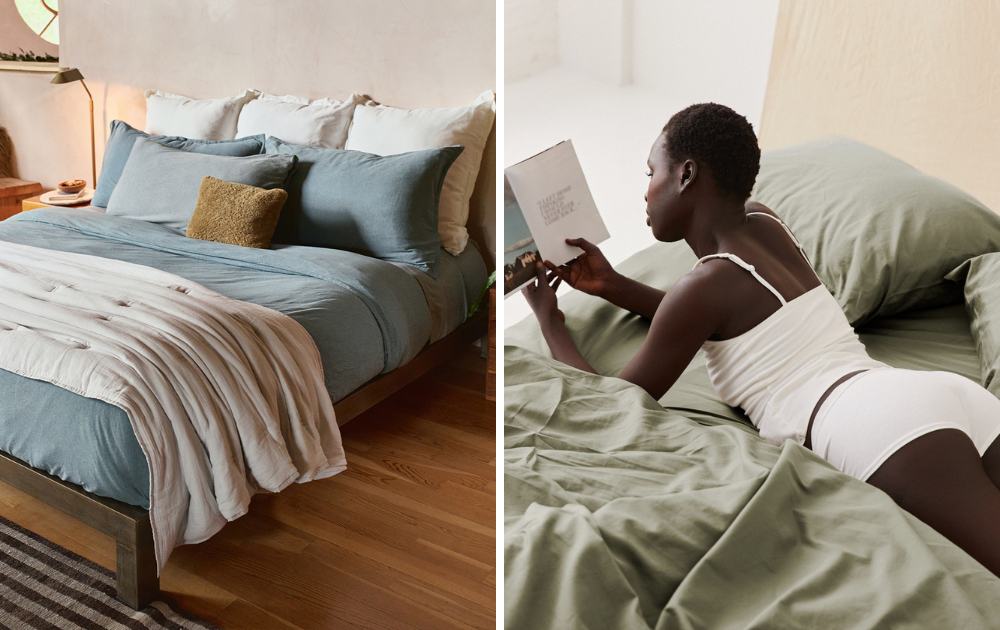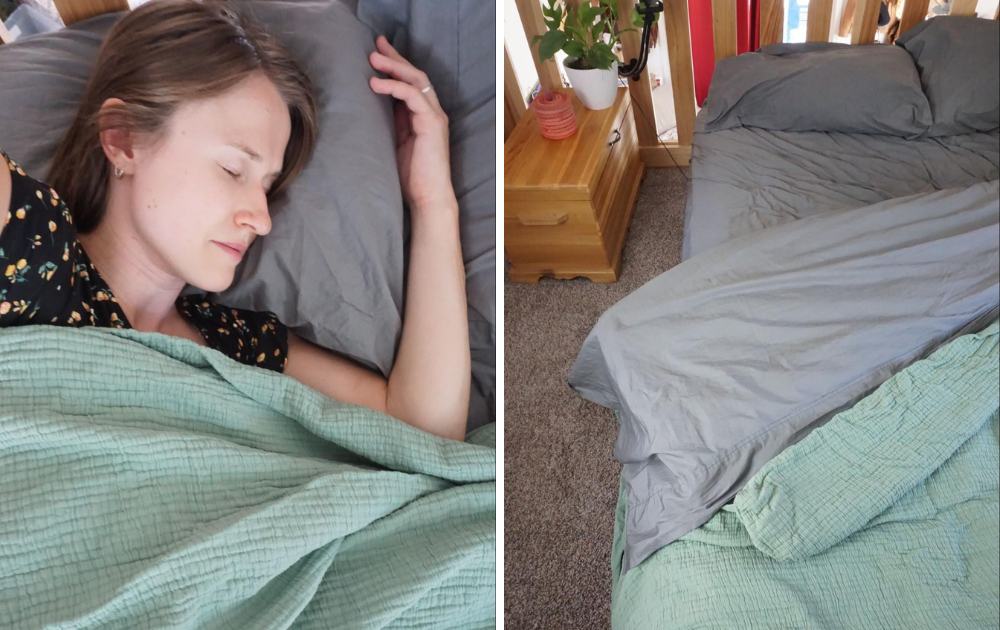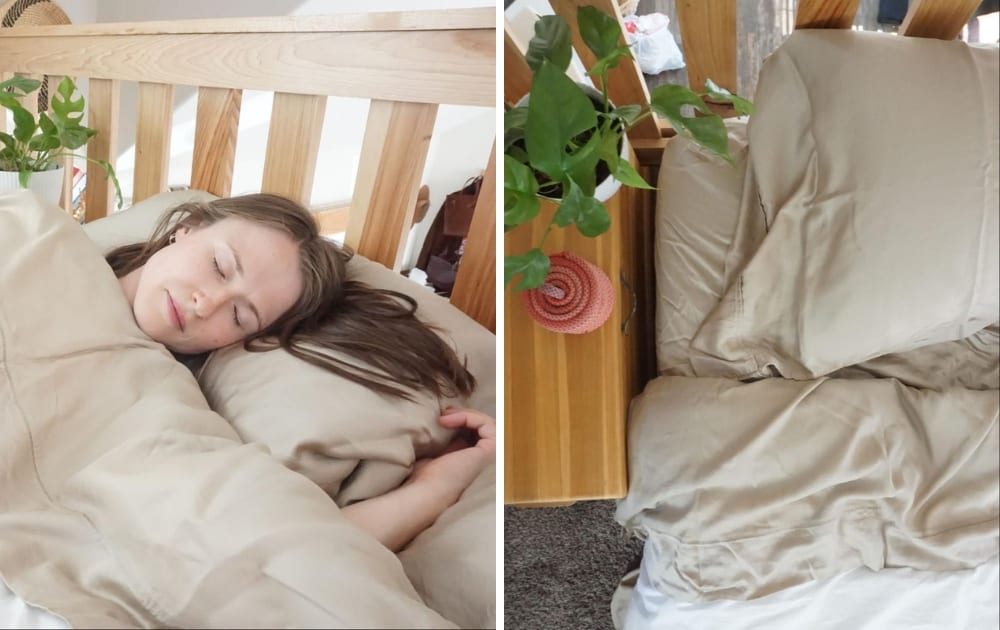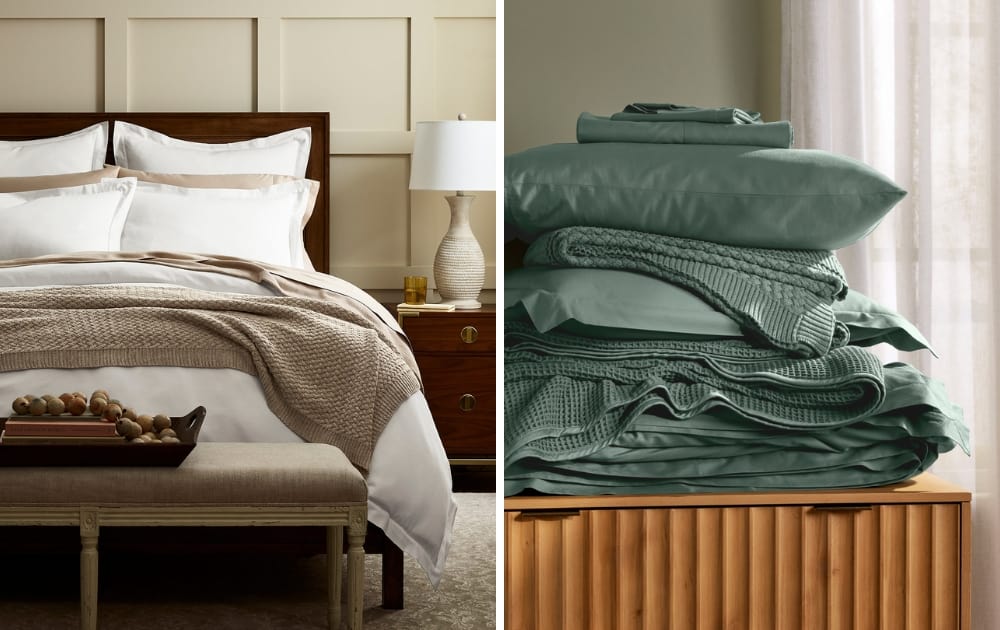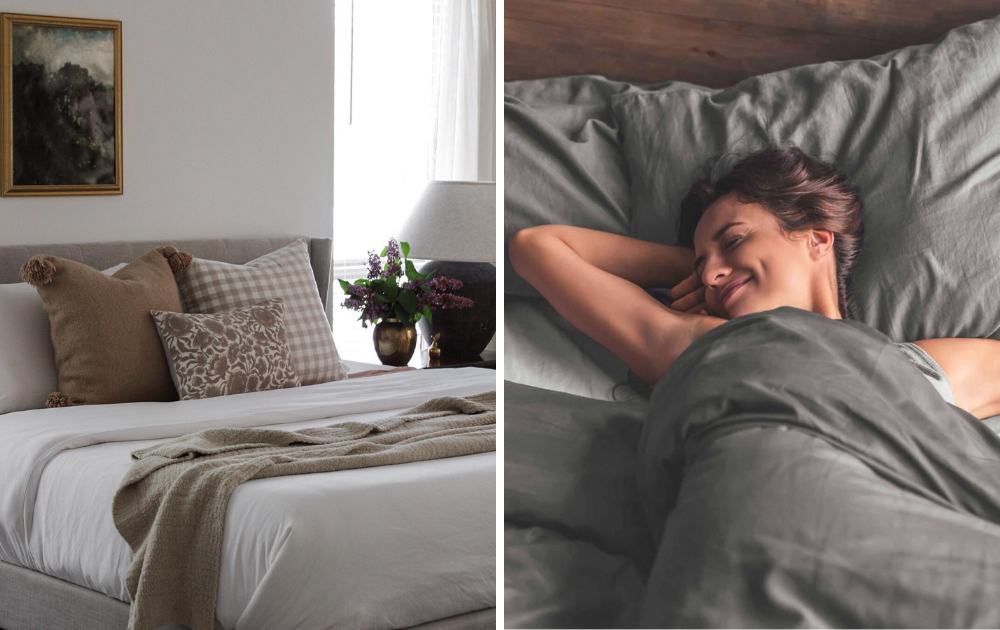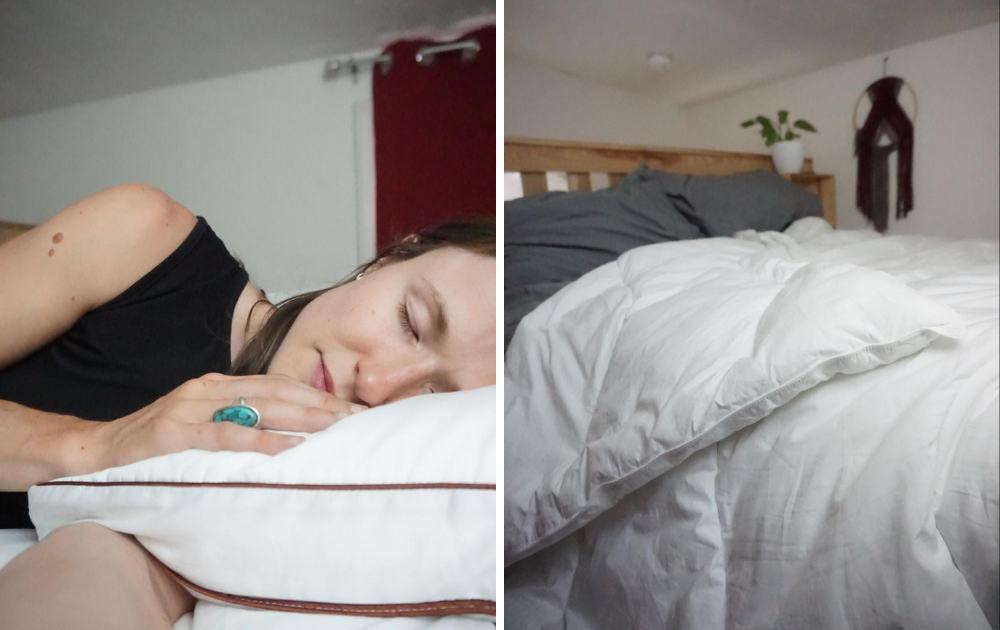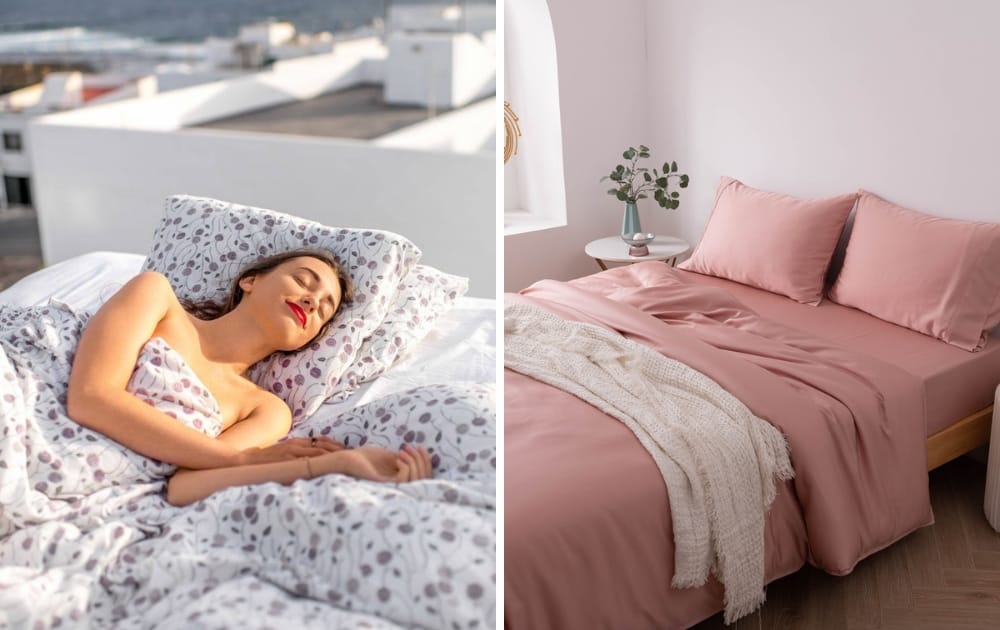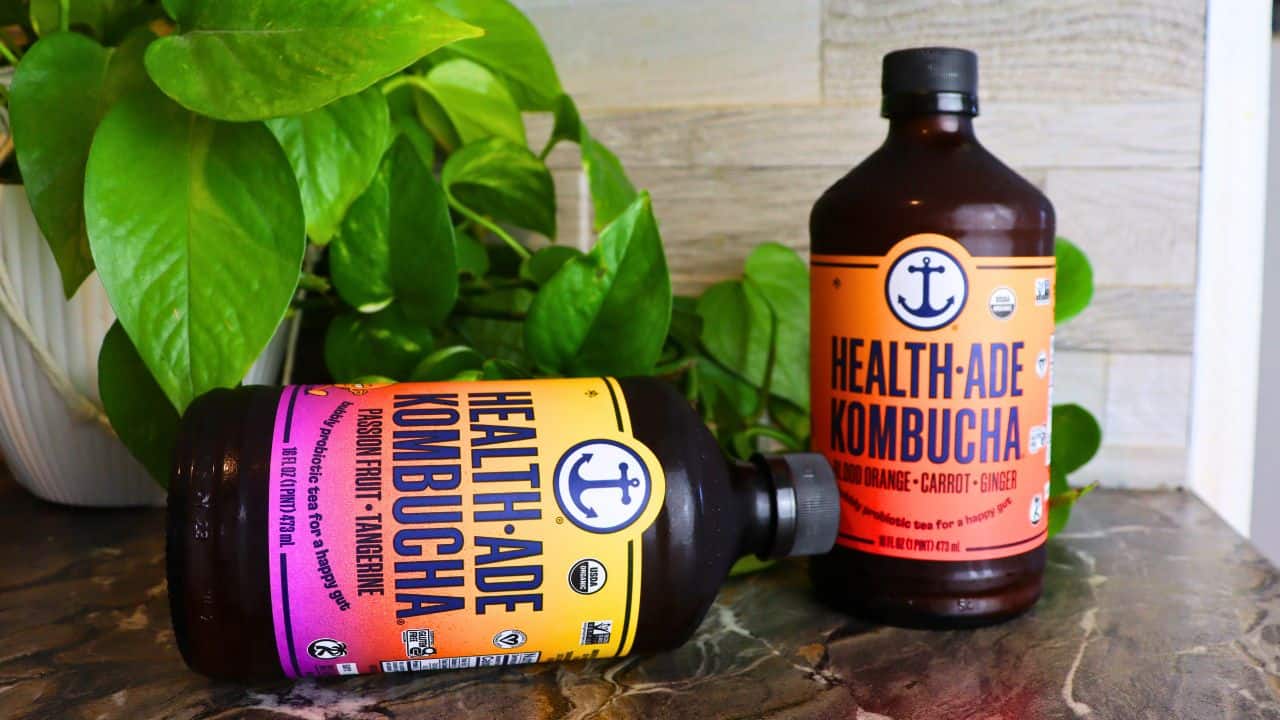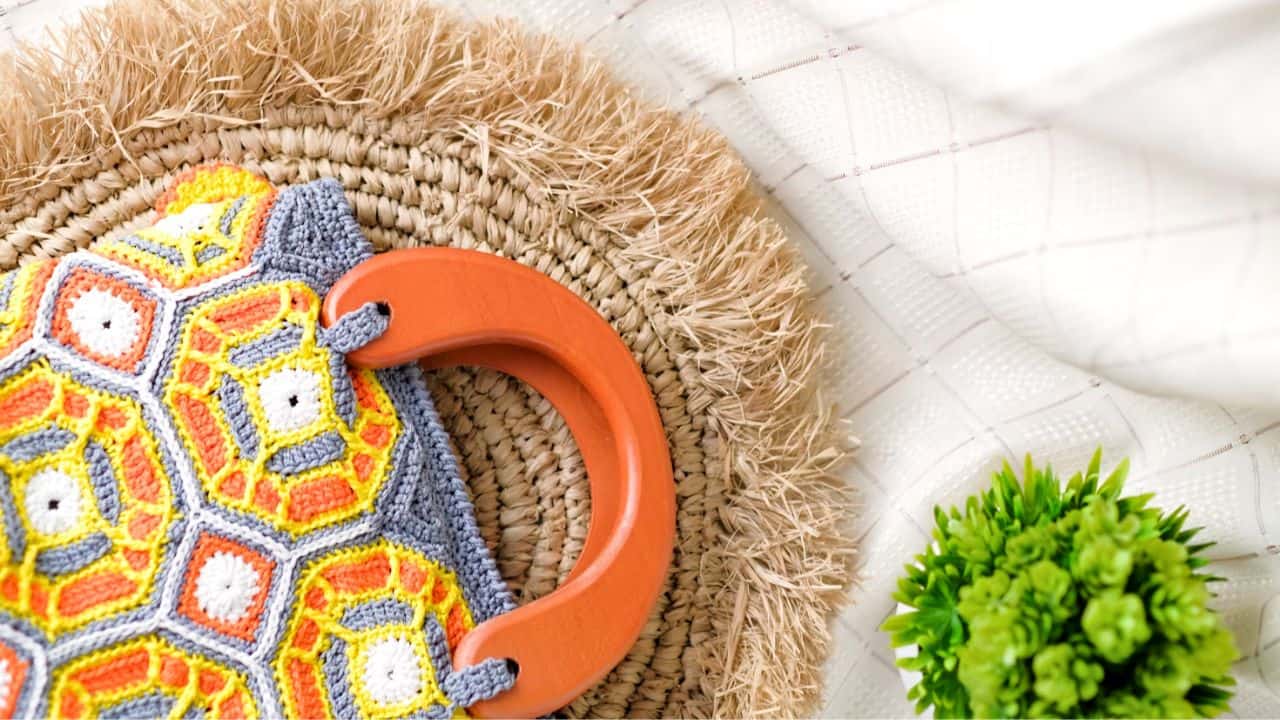Want to sleep better at night?
Don’t we all!
But between toxic chemicals in mattresses and pesticides saturating those conventional cotton sheets—not to mention all the eco-anxiety we feel about what they’re doing to the planet— that’s easier said than done.
Luckily, organic bedding brands make eco-friendly sheets, comforters, and much more that are lighter on the planet and your body.
Now that’s a dreamy deal!
A Glimpse Under The Covers Of The Best Eco-Friendly Bedding
Looking for hotel-quality? Pact’s organic cotton bedding guarantees premium comfort that’s personalized to you—and doesn’t cost the comfort of the workers behind it.
For the best sustainable bedding that’s light on price, Under the Canopy has you covered from pajama sets to duvet covers and everything in between.
MagicLinen celebrates the durable, breathable, and temperature-regulating power of linen. Their natural bedding is irresistibly soft and stylish, too.
Sleep is essential for your health. While a good bedtime routine can help you wind down, the right bedding comforts you , and helps you sleep through the night. It’s not something you want to be complacent about.
Enter: organic, natural bedding. It’s temperature-regulating, gentle on your skin, hypoallergenic, and breathable to ensure a quality night’s sleep without compromise.
So, which brands make the best organic bedding sets?
Keep reading to find out, and scroll to the bottom to uncover the criteria for how we chose these sustainable bedding brands.
Our Curated List Of Sustainable Bedding Brands For A Healthier Night’s Sleep
1. Pact
Price Range | $30–$160 | Shop Pact
Materials | The entire range uses premium GOTS-certified organic cotton yarn, though some duvet covers have non-PVC plastic buttons for fastenings.
What We Love | Pact has made a pact (sorry, we couldn’t resist!) to put people and the planet first. All their organic bedding is made with GOTS-certified cotton, which uses 81% less water and 62% less energy to produce.
Pact’s Organic Bedding
Pact gets your night off to a good start by helping you choose which bedding fabric is right for you: Cool-Air Percale, Room Service Sateen, or Favorite Tee Jersey.
Dive under the covers of these three collections or look for something specific, like eco-friendly bed sheets, pillowcases, and sets.
We love their organic comforter with its snug, quilted texture. Choose from a selection of earthy, neutral colors for a blanket that’s as versatile as it is comfy. The Quilted Comforter is medium weight, making it perfect as a standalone cover in summer and piled over a duvet in winter.
Pact’s Sustainability
Carbon Goals & Achievements | Pact works with SimpliZero to measure the impact of each product and offset it through reforestation, renewable energy, and community projects.
Supply Chain | The brand uses GOTS and Fair Trade Certified suppliers and factories in India to make their bedding.
Pay It forward | Have some old, unwanted clothes? Pact has Give Back Box®, a program that collects gently used clothes and sends them to nonprofits needing them.
2. Under The Canopy
Price Range | $24–$298 | Shop Under the Canopy
Materials | The organic materials used in Under the Canopy’s bedding include organic cotton, TENCEL™ Lyocell, eucalyptus lyocell, linen and recycled polyester. Some duvet covers have plastic button fastenings.
What We Love | The natural cotton bedding brand has been championing affordable sustainable bedding long before it was trending. You can count on them to deliver eco-friendly, stylish, and budget-conscious products with exceptional quality.
Under the Canopy’s Eco Friendly Bedding
Stylish, sustainable, affordable organic bedding is what Under the Canopy is all about. They’ve got you covered (quite literally) from pajama sets to mattress toppers and pillows and everything in between.
On top of (or rather underneath) wool blankets and organic duvet covers, they offer some of the best organic sheets to keep you cool for even better sleep.
We own their Organic Percale Sheet Set and love them especially in the summer, for their crisp feel and cooling effect.
They feature a 300 thread count for a hotel-quality finish, and the set includes a fitted sheet, flat sheet, and two pillowcases, for sizes twin to California king.
Under the Canopy’s Sustainability
Carbon Goals & Achievements | Under the Canopy calculates and offsets unavoidable carbon emissions through Carbonfund.org.
Supply Chain | The brand uses environmentally certified and vertically integrated factories in India, Pakistan, Turkey, and China.
Diversity, Equity & Inclusion | AudioEye® Digital Accessibility Platform monitors their website to ensure digital inclusion.
3. MagicLinen
Price Range | $24–$388 | Shop MagicLinen
Materials | MagicLinen’s sustainable materials are simple:linen from European flax and sustainable cotton. The linen is stonewashed, too, for even more softness.
What We Love | Imagine sleeping in five-star luxury every night—that’s exactly what MagicLinen is offering. The brand specializes in hotel-quality, made-to-order bedding that’s low-impact, high quality and oh-so-comfy.
MagicLinen’s Sustainable Linen Bedding
Linen is a natural fabric that’s durable, breathable, and regulates your body temperature. Sounds pretty perfect for your afternoon nap, right?
But that’s not all it’s good for. MagicLinen celebrates this versatile fabric throughout its bedding, sustainable homewares, and clothing
Hero pieces in their sustainable linen bedding range include the Duvet Cover Set, which comes in a single, double, and king. The extensive choice of colorways makes it easy to find a set that matches your bedroom aesthetic.
MagicLinen’s Sustainability
Carbon Goals & Achievements | All eco-friendly fabrics are sourced and processed from their home country of Lithuania and surrounding countries to minimize CO2 in transportation.
Supply Chain | MagicLinen has an in-house factory in rural Lithuania, and the ethical bedding is made by a team of 18 skilled seamstresses.
Diversity, Equity & Inclusion | The brand provides work for rural communities, and employs people with disabilities in their production team.
Pay It forward | The staff at MagicLinen frequently volunteer with local community projects.
4. ettitude
Price Range | $25–$489 | Shop ettitude
Materials | ettitude uses recycled plastic bottles for their feather-down alternative. The brand has its own CleanBamboo Hemp™, which is a blend of hemp, and bamboo lyocell fibers.
What We Love | Still not satisfied with the environmental impact of organic cotton, ettitude made their own patented fabric out of FSC-certified bamboo. It uses 500x less water and 52% fewer carbon emissions to produce than cotton.
ettitude’s Sustainable Bedding
Bedtimes and bathtimes are covered by ettitude’s collection of bath towels and bedding, all made from their CleanBamboo Hemp™.
They’ve even got vegan cashmere blankets made out of, yes, you’ve guessed it: bamboo!
ettitude’s bamboo bedding includes silky sateen ethical sheets and soft, earthy luxury linens.
They haven’t forgotten little ones with their cozy selection of organic baby bedding in the form of fitted crib sheets, waffle towels, and crib mattress protectors.
ettitude’s Sustainability
Carbon Goals & Achievements | In 2021, the non-toxic bedding brand successfully became carbon neutral by reducing air shipping by 89% and planting bamboo forests in Nicaragua through CarbonFund.
Supply Chain | All their cut-and-sew factories are audited by SMETA and BSCI for ethical standards. All new suppliers must comply with the brand’s code of ethics.
Diversity, Equity & Inclusion | The brand works internally to ensure its employees come from diverse backgrounds. They also run several scholarships to help BIPOC people and women find employment opportunities.
Pay It forward | ettitude has partnered with charity:water, a nonprofit working to provide clean, safe drinking water to people in developing countries like Nepal. They are also a member of 1% for the Planet.
5. PlushBeds
Price Range | $149–$627 | Shop PlushBeds
Materials | The organic bedding company uses GOTS-certified organic cotton and wool, bamboo rayon, GOLS-certified natural latex, and TENCEL™ throughout their bedding and mattress range.
What We Love | PlushBeds is your one-stop shop for all your GOTS-certified organic bed-to-bedding needs. Their mattresses are crafted in-house at one of the few dually certified factories in the US.
PlushBeds’ Eco Friendly Bedding
If you’re looking for organic bedding made in the USA, PlushBeds delivers reliable dedication to superior comfort and sustainable snoozing across its range.
Find 100% silk pillowcases, vegan TENCEL™ sheets, natural wool comforters, and snugly down comforters, all made with ethically sourced materials.
We personally adore their Vegan Silk Sheets. Made with closed-loop and FSC-certified TENCEL™ lyocell sustainably derived from eucalyptus plants, we would have never guessed these sheets were not real silk had we not known.
Want to make your mattress last longer?
PlushBed’s organic mattress protector does just that. It’s made with GOTS-certified organic cotton and a non-toxic waterproof underlayer to keep your mattress nice and dry. It’s temperature-regulating, too, for a quality night’s sleep.
PlushBeds’ Sustainability
Carbon Goals & Achievements | All carbon emissions produced from running the PlushBeds website are offset through TerraPass.
Supply Chain | All mattresses are handmade in their factory in California and sustainable materials are sourced from organic, sustainable, and ethical farmers.
Pay It forward | The brand has a PlushBeds Scholarship Program for students wanting to pursue eco-degrees. They further their support of in-need youth by being a long-term sponsor of the Ed Asner Family Center and Every Kid Counts. A portion of every sale is donated to these organizations.
6. Boll & Branch
Price Range | $22–$396 | Shop Boll & Branch
Materials | The brand’s bedding materials include organic cotton, linen made from Belgian flax, and humanely-sourced alpaca wool.
What We Love | Boll & Branch has done bedding differently from day one. That’s why they were the first organic Fair Trade Certified bedding company. Rest easy knowing your bedding is free from toxins and 100% traceable.
Boll & Branch’s Sustainable Bedding
‘Softer than soft’ is Boll & Branch’s motto.
They’ve got an extensive collection of sustainable bed sheets, bedding, duvet sets, and pillowcases made from luxurious organic cotton. Browse bedding fabrics based on your texture preferences, including fluffy waffle, chic percale, and light linens.
For a fresh, modern look in the bedroom, the Matelasse Windowpane Duvet Set has a relaxed Chambray fabric, which is soft to the touch and easy on the eyes.
With colors in muted whites and greys, they’re perfect for an understated look that you can layer with texture and accent throws.
You can also make sure your little ones sleep safely with their organic toddler bedding that fits cribs and twin-sized beds.
Boll & Branch’s Sustainability
Carbon Goals & Achievements | The brand has offset over 8.4 metric tons of carbon emissions so far, and saved over 21,000 metric tons of emissions by boating their goods instead of flying.
Supply Chain | Bedding is crafted in GOTS and/or Fair Trade factories in India, Portugal, and the US. They also source their cotton from Fair Trade farmers. They’ve paid over $880,000 in additional wages for factory workers and farmers since 2014.
Pay It forward | They allocate an impressive 10% of sales to their Helping From Home program, which has donated thousands of mattresses, pillows, and bedding bundles to those in need, as well as over $200,000 to Habitat For Humanity and disaster relief organizations.
7. SOL Organics
Price Range | $39–$229 | Shop SOL Organics
Materials | SOL Organics’ materials are 100% organic cotton and 100% OEKO-TEX-certified European linen that’s stonewashed for softness.
What We Love | SOL Organics makes the best organic sheets and bedding with soul. The brand keeps it simple with 100% organic, fully traceable, and sustainable cotton bedding that’s better for us and the planet.
SOL Organics’ Organic Cotton Bedding
SOL Organics makes affordable, eco-friendly bedding with luxurious quality.
They have fair trade sheets, pillowcases, duvets, pillows, shams, and comforters in a choice of four material types made from organic cotton. These include percale cotton, sateen cotton, linen, and flannel.
If you’re looking for a sustainable place to lay your head, their Organic Sateen Cotton Classic Pillowcase set has a 300-thread count for a buttery-smooth, utterly luxurious feel.
Plus, the silky quality helps to regulate your temperature, so there’s no need to flip your pillows in search of that cool side. Pair them with their soft organic sheets for the perfect match.
SOL Organics’ Sustainability
Carbon Goals & Achievements | Orders are shipped carbon-neutral courtesy of their courier partner, Route.
Supply Chain | SOL Organics works with a trusted FLOCERT factory in India that pays their workers a fair wage, empowers women and guarantees no child labor. The brand is also Fair Trade Certified, and its supply chain is traceable from farm to factory.
Pay It forward | All purchases of their sustainable cotton or linen sheets means a donation to organizations like Water4 and the Humane Society’s Fund for Animals.
8. Saatva
Price Range | $95–$650 | Shop Saatva
Materials | The brand uses organic cotton and Belgian linen in their bedding. They also use vegan-friendly, synthetic, hypoallergenic feather-down alternatives.
What We Love | Saatva makes luxurious bedding and organic mattresses that don’t compromise sustainability. Crafted by experts, each bedding solution promises the perfect night’s sleep that’s personalized to you.
Saatva’s Organic Bedding
Saatva has a snug collection of eco-friendly bedding sets, quilts and comforters, lightweight mattress toppers, memory foam pillows, and weighted blankets.
You can also start with a good bedding foundation with one of their mattresses. If you’re stumped in choosing the right one for you, there’s a quiz to help you out.
Mattresses tend to have a high price tag, and if you’re not ready to splurge, a mattress topper can make all the difference.
Saatva’s Graphite Memory Foam Mattress Topper is here to save your nighttime woes with its body-hugging comfort and advanced cooling technology. Its memory foam is made from CertiPUR-US® certified renewable oils and has a botanical antimicrobial treatment to keep mold and mildew at bay.
Saatva’s Sustainability
Carbon Goals & Achievements | Saatva crafts their made-to-order mattresses in the US to reduce their carbon footprint in transport. Their US-based factories are also powered by renewable energy. For remaining emissions, they partner with Evertreen to offset their carbon footprint and help support local farmers through forest restoration projects across the globe.
Supply Chain | Their sustainable cotton sheets and bedding is all made from 100% Fair Trade certified cotton. Some products are made in the USA, but not all, but all are fully traceable from farm to factory.
Pay It forward | In addition to planting trees, they work with social organizations like Austin Pathways and Habitat for Humanity.
9. Olive + Crate
Price Range | $25–$150 | Shop Olive + Crate
Materials | The brand’s hero material is TENCEL™ made from eucalyptus.
What We Love | Olive + Crate helps hot sleepers stay cool at night with their range of breathable, moisture-wicking bedding made of eco-friendly eucalyptus TENCEL™. This material uses 96% less water than cotton. It’s also fully compostable and safe for sensitive skin.
Olive + Crate’s Sustainable Bedding
Find yourself overheating at night?
One of the best eco-friendly bedding brands, Olive + Crate, uses TENCEL™ fabric made from eucalyptus for cool, dry, and restful sleep.
Olive + Crate’s best selling Eucalyptus – TENCEL™ Fiber Sheet Set sends you off to a blissful dreamland with its super soft quality and silky feel. Available in metallic tones and sizes from twin to king, they’ve got you covered all year round.
Browse their range of temperature-controlling, moisture-wicking sheet sets, duvet covers, pillowcases, sleep masks, and crib sheets. They also offer bundle+save discounts to help you stay on budget with your sustainable bedding sets haul.
Olive + Crate’s Sustainability
Carbon Goals & Achievements | The brand intends to become carbon-neutral by offsetting its emissions and adopting renewable energy at head office.
Supply Chain | Olive + Crate’s bedding is made from TENCEL™ fiber produced in Europe and assembled in factories in China. We would like to see more transparency about how they ensure fair treatment and wages in the factories they work with.
Pay It forward | They donate all bedding returns to the local shelters in the Cincinnati, OH region.
How Did We Choose The Best Organic Bedding Brands?
Is there such a thing as sustainable bedding? If so, how do we know what the most eco-friendly bedding brands are?
We’ve created a set of criteria to help us uncover the brands that make bedding the right way.
Sustainability doesn’t have to be perfect, and not every box needs to be ticked, but we like to see brands taking action rather than snoozing on their environmental footprint.
That means swapping synthetic materials for natural fabrics, working with suppliers that adhere to ethical standards, and opting for organic to make healthier bedding for you and the planet.
Certifications: Global Organic Textile Standard (GOTS), OEKO-TEX®, eco-INSTITUT, Global Organic Latex Standard (GOLS), Forest Stewardship Council (FSC), Fair Trade Certified™, CertiPUR-US®, FLOCERT, Sedex Members Ethical Trade Audit (SMETA), Business Social Compliance Initiative (BSCI)
Fabrics & Materials:
The ‘organic’ in the best organic sheets ensures your sheets are free from harsh chemicals, dyes and pollutants from farm to factory.
It’s not enough to opt for materials like cotton and call it a night.
Cotton production uses pesticides and fertilizers, causing soil degradation, biodiversity loss, and water contamination. Cotton is one of the highest water guzzlers of any agricultural crop. It takes 10,000 liters of water to produce 1 kilo of cotton.
Even “sustainable” cotton sheets can be rife with greenwashing. What we really want to see is certified organic materials—like organic cotton or linen.
For us, the most sustainable, non-toxic bedding is made from an organic, natural source, whether that’s cotton, flax, bamboo, hemp, eucalyptus or the equivalent. We don’t want to see synthetics like polyester because you’re essentially getting into bed with microplastics.
Carbon Goals & Achievements:
Now that climate change is reaching a critical point, we like to see brands taking their carbon footprint seriously.
Offsetting emissions with some of the world’s best carbon offset programs is a good start, but finding ways to reduce their carbon footprint overall—via smaller supply chains, renewable energy, and smart shipping methods—is where the green is really at.
Supply Chain:
Ethical bedding brands should be aware of the ethical issues surrounding unfair labor practices in textile production and factories. We want to see sustainable bedding brands have fully traceable supply chains from farm to factory, ensure their suppliers pay their workers a fair wage, and don’t use child labor.
Diversity, Equity & Inclusion:
We like to see sustainable bedding that goes above and beyond for the employees, suppliers, and communities for a fair and equitable world.
This can offer employment opportunities and scholarships, support people from diverse backgrounds, empower their staff, and fund charitable initiatives.
Pay It forward:
Organic bedding brands that support charitable causes are a big plus but not essential, as we know it can be expensive for smaller businesses.
Closing Thoughts On Organic & Non-Toxic Bedding Brands
The material that makes your bedding matters. The textile industry accounts for 20% of global clean water pollution through dyeing and finishing.
Plus, synthetics like polyester are responsible for 35% of microplastics released into the environment when they’re washed.
So, are organic cotton sheets and bedding any different?
Organic cotton sheets mean zero pesticides and fertilizers are used in production. As a result, the soil quality is maintained, and there’s less water run-off.
It’s unclear quite how much water is saved in organic cotton versus conventional cotton (a study by the Textile Exchange concluded it was 91%, but this has since been debunked). However, water run-offs are free from harmful contaminants.
Organic fabrics with certifications from third-party accreditors like GOTS also mean farmers and workers are paid a fair wage throughout the supply chain.
That’s something to sleep easy on, so we encourage you to spread the sweet dreams by sharing this article.

